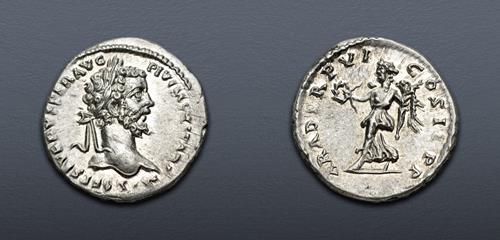|
Septimius Severus. AD 193-211. AR Denarius (18mm, 3.69 g, 12h). Laodicae ad Mare mint. Struck AD 198. L SEP SEVERVS PER AVG PIV IMP XI PAR P M, laureate head right / AR AD TR P VI COS II P P, Victory advancing left holding wreath and palm frond. RIC IV 494A var. (obv. legend); RSC 52a var. (same); Murphy, SEV-155 (same obv. die). Attractively toned with luster, obverse slightly off center. Superb EF. Very rare with this obverse legend.
From the Weise Collection, purchased from Barry Murphy, 2004.
Adiabene and Scenite Arabia were small buffer states between the Roman and Parthian Empires, nominally allied to the Parthians. Adiabene, located east of the Roman client kingdom of Osrhoene, was ethnically diverse, with a substantial Jewish population. The Scenite (“tent dwelling”) Arabs occupied another part of Mesopotamia. During the Roman civil war of AD 193-194 between Septimius Severus and Pescennius Niger, both principalities seized on the opportunity to enlarge their kingdoms at the expense of Roman client states. After Severus defeated and killed Niger in May of 194, he lingered in Syria the rest of the year, meting out punishment to cities and regions who had supported Niger and rewarding those who had shown loyalty to the Severan cause. Wintering at Antioch, Severus entertained embassies from the Adiabeni and Scenite Arabs, who protested that they had only attacked Roman possessions that had backed Niger. Severus rejected these entreaties and, early in AD 195, marched his army into Mesopotamia, formally annexed Osrhoene, and attacked in quick succession the Adiabeni and Scenite Arabs. He easily overcame both and assumed the titles Parthicus Arabicus and Parthicus Adiabenicus, which are preserved on this rare denarius type, as well as on the Arch of Severus in Rome. The reference to “Parthicus” in each acclamation acknowledges that both of these peoples were Parthian vassals, without overtly claiming a victory over the Parthians themselves (this would come in a subsequent campaign). Severus struck silver denarii and gold aurei celebrating these titles with two main reverse types: Two captives bound at the base of a trophy, and, as seen here, Victory advancing left.
Closing Date and Time: 5 June 2024 at 15:03:00 ET.
All winning bids are subject to a 20% buyer’s fee.
|
